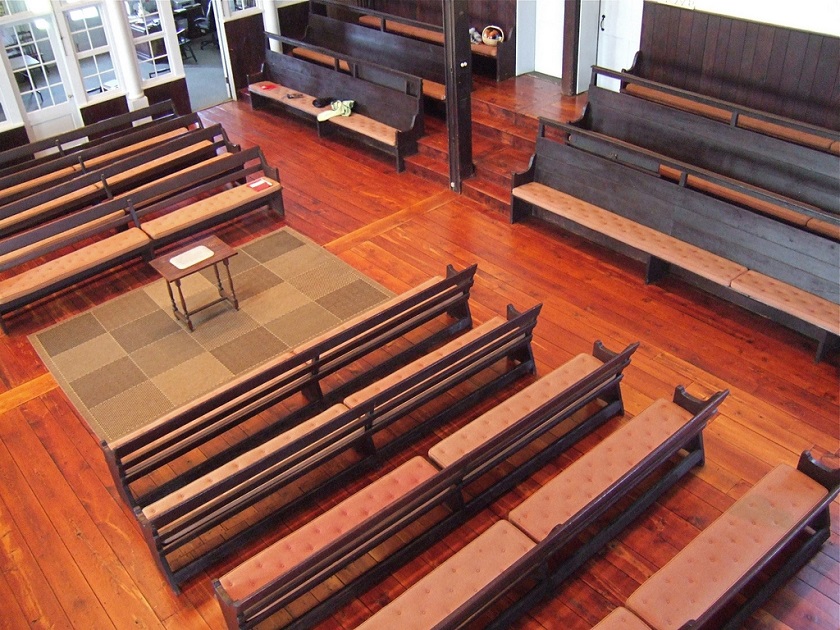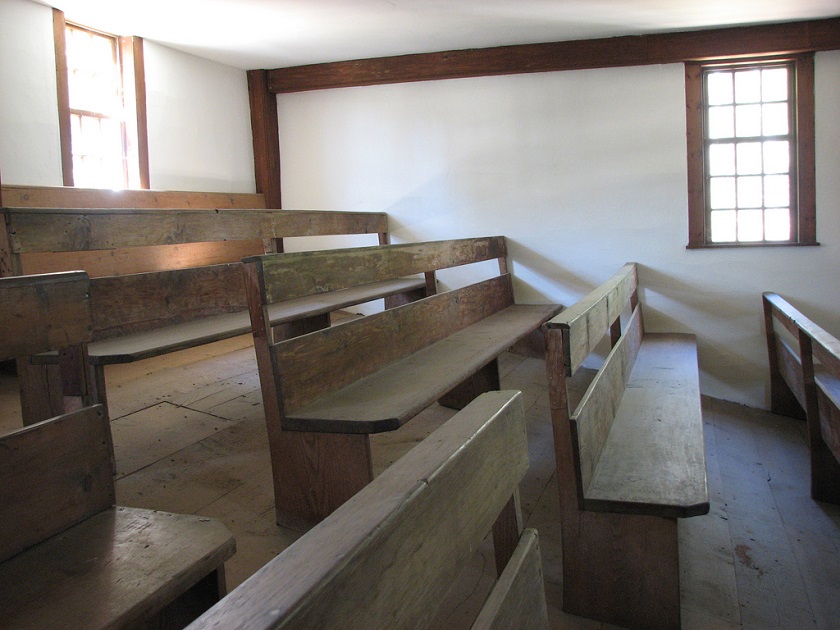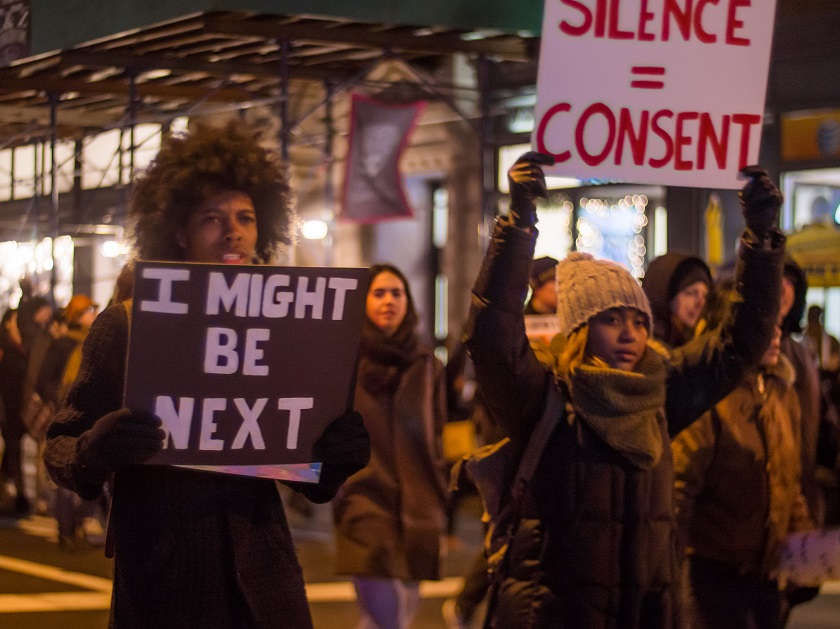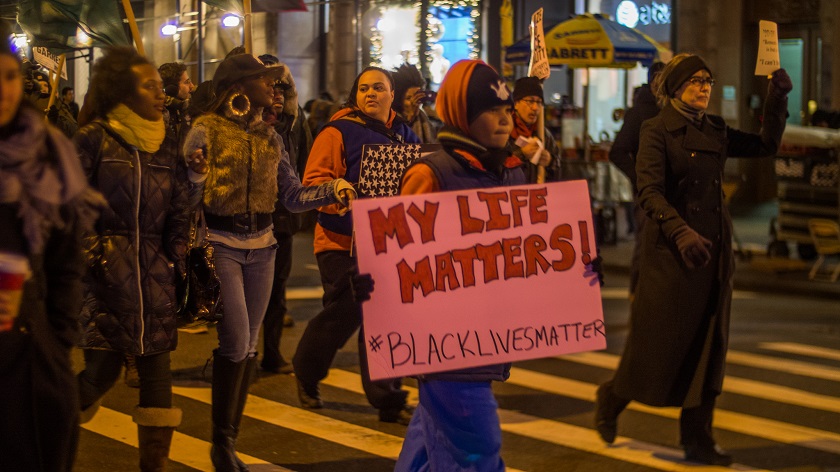Sam Lemon is a member of Providence Monthly Meeting in Media, PA. In this spiritual autobiography, Sam describes his inward journey as a Quaker and the way it connects to his outward journey for racial justice. This is the second installment in a series featuring the writings of contemporary Black Quakers on the subject of Black Lives Matter.
Among my earliest memories, are those of sitting in my family’s pew in our old Anglican church looking up toward the vaulted wooden ceiling, mesmerized by the massive oil painting above the alter, of Mary and Joseph holding onto the Christ child as a white dove hovers silently over his head.
As a child, I envisioned God as an old white man with long hair and beard, who lived in the clouds, occasionally revealing himself as if appearing in the aperture of antique brooch. But church never felt like my spiritual home. I had many questions, and the Bible lessons I learned always seemed to leave out critical answers. Who exactly was the Holy Ghost, and since only women can bear children, why were all three parts of the Holy Trinity, men?
Unaware at the time that I was actually a Quaker in the body of an Episcopalian, the Inward Light eventually led me from our solemn stained glass church, bedecked with shiny brass crosses, crushed velvet, and trinkets of gold and silver, to a plain old stone Meetinghouse in a shady grove a mile across town. It was there I found my spiritual home.
 My family has a complex belief system. The liberation theology of my ancestors who had been runaway slaves sheltered by Quakers during the Civil War, was a confluence to the devout Christianity of my West Indian great-grandmother, whose practice of island religion was just as resolute. Our beliefs in ghosts and angels were bound tightly by a spiritual cement which proved enduring and multifaceted.
My family has a complex belief system. The liberation theology of my ancestors who had been runaway slaves sheltered by Quakers during the Civil War, was a confluence to the devout Christianity of my West Indian great-grandmother, whose practice of island religion was just as resolute. Our beliefs in ghosts and angels were bound tightly by a spiritual cement which proved enduring and multifaceted.
Leaving the church with its religious accoutrements and a powerful pipe organ that pumped out choruses as full and fluid as the current in a river, I would soon learn to seek my revelations in the beauty of silence, discerning the differences between leadings and longings, duties and chores. I wasn’t seeking saintly perfection, but a humble humanity that allowed me to throw off the shackles of some original sin I had never committed, and to reject the accompanying feelings of perpetual guilt and unworthiness. Our lives had been hard and I wanted to be at peace with myself in this world – not only in the next.
Forgiving myself for my lack of perfection was a blessing. While sitting in the silence of our old Meetinghouse, listening for the answers I had long sought and knew were there, I learned to look deeply inward, into those shadowy places of fear and wrongs and rationalizations; freeing myself from angst and shame, my spirit transforming from a pupa into a butterfly, warmed by the Inward Light – I flexed my new wings. I wasn’t “born again” – I rediscovered myself. I remembered who I was born to be, welcoming him back like a prodigal son.
 Second Corinthians wafted into my mind: “Not of the letter but of the Spirit; for the letter killeth, but the Spirit giveth life.” I needed no holy book to guide me, because Life was the Book. I no longer struggled to define God because that concept is undefinable. It is as the Lakota say: “Wakan Tanka” – the Great Mystery.
Second Corinthians wafted into my mind: “Not of the letter but of the Spirit; for the letter killeth, but the Spirit giveth life.” I needed no holy book to guide me, because Life was the Book. I no longer struggled to define God because that concept is undefinable. It is as the Lakota say: “Wakan Tanka” – the Great Mystery.
I felt a renewed connection with that which runs through and is a part of all things, every bit as much as dark energy. God was not a personality, but a form of consciousness. The old Quaker treatise – The Light Upon the Candlestick– enlightened me. “Cleave the wood and I am it in, Lift the stone and there am I.” I had finally found religious freedom.
I could now see those things beyond the realm of vision, and sense even more beyond that. And I could feel the weight of the accumulated prayers of countless souls who had gone before me, whether walking through an ancient French cathedral or sitting in the silence of my 200 year old Meetinghouse. There was no one true way – there was only the way.
 My leadings have led me to fight for justice, by protesting the wrongful execution of a 16 year old African American youth from Delaware County named Alexander McClay Williams, who, in 1931 was convicted and sent to the electric chair for a crime he did not commit – the murder of a white school matron. Lurid headlines falsely implying rape and urging racial hatred inflamed bloodlust in the community.
My leadings have led me to fight for justice, by protesting the wrongful execution of a 16 year old African American youth from Delaware County named Alexander McClay Williams, who, in 1931 was convicted and sent to the electric chair for a crime he did not commit – the murder of a white school matron. Lurid headlines falsely implying rape and urging racial hatred inflamed bloodlust in the community.
With each disturbing article I read about another unarmed person of color or poverty being shot dead in the street by police without just cause; or of some woman of color raped in a patrol car or mysteriously hanging herself in a jail cell because she couldn’t stand the shame of a minor traffic violation – I am reminded that our nation has not achieved “equal justice under law.” There is ample evidence that many of the gains made during the Civil Rights era, paid for with the lives and the blood of those who suffered and died for freedom and human rights have steadily eroded. America is under siege and each of us is now called to fight for clean water and air, for peace, justice, equality, and a future for our planet.
Albert Einstein called racism “a disease of white people,” and said “I do not intend to be quiet about it.” He reasoned: “If I were to remain silent, I’d be guilty of complicity.” And Friends must not remain silent about it, either.

Related Content
Out of the silvery silence: The prophetic call of Black Lives Matter